|
|
|
Sort Order |
|
|
|
Items / Page
|
|
|
|
|
|
|
| Srl | Item |
| 1 |
ID:
173438
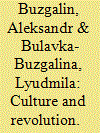

|
|
|
|
|
| Summary/Abstract |
The article shows the dialectic of the relationship of revolution and culture as two sides of creativity - social and art. In a dialogue with the philosophy of Mikhail Bakhtin, the authors reveal culture as the removal of alienation (disalienation) in the process of subject-subjective dialogue, in which a qualitatively new reality is created – Truth, Beauty, Good, a new person is born - a man-creator, and as such, culture is revolutionary. The second side of this connection - the revolution as a culture - is revealed by the authors on the example of the social creativity of revolutionary Russia, the poet of which was Vladimir Mayakovsky. The article gives a panorama of the historical practices of art and social creativity of the 1920s. The authors show that the counterpoint to these practices was the relationship of conformism, bureaucracy and other forms of social alienation which led the Soviet project to the dead end. The authors conclude that disalienation in the social and cultural spheres is possible only to the extent that the sociopolitical revolutionary changes are carried out in unity with the liberation of the cultural potential of the masses, and art creativity is interfaced (united) with social creativity.
|
|
|
|
|
|
|
|
|
|
|
|
|
|
|
|
| 2 |
ID:
172374
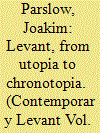

|
|
|
|
|
| Summary/Abstract |
This essay responds to this special issue’s challenge of thinking the Levant through Bakhtin’s notion of the chronotope, with a theoretical reflection on the potentials and limitations of chronotopic thought in social and historical scholarship. The essay is structured around two questions. First, given the overwhelmingly literary associations with which we tend to approach Bakhtin’s thought today, is the chronotope a tool for literary analysis only, or is it applicable to other forms of communication, cognition, and action? Second, what implications does chronotopic analysis have for scholarship that seeks methods of analysing and writing about the Levant in a historically and politically responsive way? Should chronotopes always be understood as the a priori horizon of meaningful narration, as frameworks that make certain plots, events, interpretations, and actions possible while precluding others, or are they also an observable and manipulatable aspect of communication, one that can be subject to the quotidian equivalent of authorial intention, creative reception, and political contestation? Placing the chronotope in the context of Bakhtin’s earlier philosophical project, I argue that although the chronotope facilitates the reflexivity and subversiveness which Bakhtin sees as defining and ethically necessary achievements of modern discourse, these characteristics are both self-limiting and morally ambiguous.
|
|
|
|
|
|
|
|
|
|
|
|
|
|
|
|
| 3 |
ID:
172373
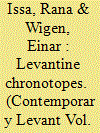

|
|
|
|
|
| Summary/Abstract |
Like all contested concepts, the term ‘Levant’ is unstable. Both its academic and political uses are geographically and historically fairly loose and ill-defined. This geo-historical instability makes room for the multiplicity of chronotopes that the contributors lay out in this special issue. In order to bring these contributions together, we also use the theoretical concept of the chronotope, the way that authors and actors under study bring together time and space in their legitimation of political efforts in the present. The chronotopes treated here have far-reaching implications in our experience and knowledge of the Levant. With Bakhtin’s chronotopic method, we approach the region through its entangled history, taking people’s mobility, their composite identities, and the major transformations in their lives as the central concern for analysis.
|
|
|
|
|
|
|
|
|
|
|
|
|
|
|
|
| 4 |
ID:
123054
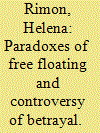

|
|
|
|
|
| Publication |
2013.
|
| Summary/Abstract |
Throughout the 1900s, intellectuals have been defined as a "privileged minority" (according to Chomsky), or as outsiders, whose "free floating" condition (Mannheim) guarantees their functioning as "custodians of values like reason and justice" (Hofstadter). Julien Benda accused intellectuals of betraying this mission. But, perhaps, betrayal is built into the very nature of their privileged position; perhaps, by pretending to be "free floating," generations of intellectuals have actually been constructing predictable paradigms, using calamity as a new kind of raw material for the old myth of lucrimax (Etkind). The tragic experience of Russian intellectuals provides us with fresh insight for this discussion.
|
|
|
|
|
|
|
|
|
|
|
|
|
|
|
|
| 5 |
ID:
124914
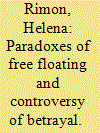

|
|
|
|
|
| Publication |
2013.
|
| Summary/Abstract |
Throughout the 1900s, intellectuals have been defined as a "privileged minority" (according to Chomsky), or as outsiders, whose "free floating" condition (Mannheim) guarantees their functioning as "custodians of values like reason and justice" (Hofstadter). Julien Benda accused intellectuals of betraying this mission. But, perhaps, betrayal is built into the very nature of their privileged position; perhaps, by pretending to be "free floating," generations of intellectuals have actually been constructing predictable paradigms, using calamity as a new kind of raw material for the old myth of lucrimax (Etkind). The tragic experience of Russian intellectuals provides us with fresh insight for this discussion.
|
|
|
|
|
|
|
|
|
|
|
|
|
|
|
|
| 6 |
ID:
190188
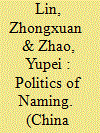

|
|
|
|
|
| Summary/Abstract |
This article focuses on the carnival aspects of Chinese Internet culture, but it goes further by suggesting that the productiveness of the online carnival leads to the politics of naming in China’s specific context. This article illustrates the questions of how Chinese Internet users name themselves diaosi (“losers”) to separate and distance themselves from the governing power, how they identify the Zhao (“elites”) to form an internal antagonistic frontier in the “us vs. them” context, and how the diaosi are “floating” and appropriated as xiaofenhong (“little pinkos”) to identify the external enemy rather than the rulers inside. This kind of online carnival is not merely a cultural issue, but is also a political and governing theme that has its roots and routes in contemporary China’s governing rationality.
|
|
|
|
|
|
|
|
|
|
|
|
|
|
|
|
| 7 |
ID:
172378
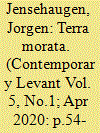

|
|
|
|
|
| Summary/Abstract |
When Menachem Begin, Israeli prime minister and founder of the Likud party, formulated Israel’s claim to the West Bank, he did not utilise the classic terra nullius settler argument. Instead, his ideological claim was that the land was a terra morata, a territory which had been in a state of ‘extratemporal hiatus’, to borrow a term from Bakhtin. This was illustrated through his insistence on using the Biblical names Judea and Samaria to denote the West Bank. The Zionist claim to the land was thus not that it lacked a sovereign, but rather that the sovereign had returned. The Israeli occupation was thus construed as a resumption of history, while the Palestinians were placed outside history, negating their historical and contemporary claim to the land. This article analyses how Begin’s worldview played out by investigating the self-rule proposal for the Palestinians which he launched in 1977. This proposal (if implemented) would have postponed any claims of sovereignty over the territory indefinitely, while ensuring that the Palestinians gained no national autonomy. In essence, Palestinian self-rule was a sleight of hand. For Begin the West Bank (and Gaza) were eternally Jewish territories, and the Palestinians mere residents on the land. Unlike Israeli settlers, they were not considered to be of the land.
|
|
|
|
|
|
|
|
|
|
|
|
|
|
|
|
| 8 |
ID:
163098
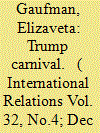

|
|
|
|
|
| Summary/Abstract |
This article argues that a Russian analytical paradigm of carnival culture can help explain the successful presidential campaign of President Donald J. Trump. Russian philosopher and literary critic Mikhail Bakhtin developed the notion of carnival culture while analyzing Francois Rabelais’ work and its connection to the popular culture of Renaissance. Carnival ethos stood in opposition to the ‘official’ and ‘serious’ church sanctioned and feudal culture, by bringing out folklore and different forms of folk laughter that Bakhtin denoted as carnival. Carnival culture with its opposition to the official buttoned-up discourse is supposed to be polar opposite, distinguished by anti-ideology and anti-authority, in other words, anti-establishment – the foundation of Trump’s appeal to his voters. This article examines the core characteristics of carnival culture that defined Trump’s presidential campaign from the start.
|
|
|
|
|
|
|
|
|
|
|
|
|
|
|
|
|
|
|
|
|